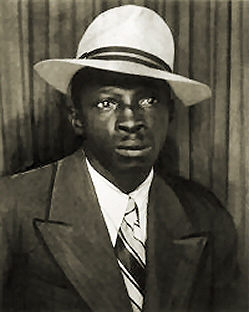<Back to Index>
- Bluesman Sonny Boy Nelson, 1908
- Bluesman Tommy McClennan, 1908
- Bluesman Charles "Papa Charlie" McCoy, 1909
PAGE SPONSOR

Sonny Boy Nelson (December 23, 1908 – November 4, 1998) was an American blues musician.
He was born Eugene Powell, in Utica, Mississippi, United States, the child of an interracial affair and his white father soon abandoned the family. His family soon moved to a plantation at Lombardy, near Shelby, Mississippi. Nelson learned to play the guitar by the age of seven. Together with his half brother Ben on a mandolin, Nelson began to play as a novelty act at picnics and suppers, and for prisoners at the Mississippi State Penitentiary. In 1915, his half brother, Bennie "Sugar" Wilson, may have been the inspiration for Nelson to learn the banjo - mandolin. Nelson became friends with the Chatmon family, as both families worked together on the Kelly Drew Plantation in Hollandale, Mississippi.
He later married fellow singer, Mississippi Matilda.
Nelson played many musical instruments, including banjo, guitar, harmonica, horn, mandolin, violin, and played lead most of the time when accompanied with another musician. Nelson's guitar was a Silvertone and he inserted an aluminum resonator into it similar to those found on the National guitar. He also fitted a seventh string, using the 12 string models as his inspiration. The extra string was a 'C' an octave higher than the conventional string. Later electric styles overshadowed his fame, and he went on to live a quiet life until his death.
Nelson died in November 1998, in Greenville, Mississippi, at the age of 89.

Tommy McClennan (April 8, 1908 – circa 1962) was an American Delta blues singer and guitarist.
McClennan was born on a farm near Yazoo City, Mississippi, United States, and grew up in the town. He played and sang blues in a rough, energetic style.
He made a series of recordings for Bluebird Records from 1939 through 1942 and regularly played with his friend Robert Petway. He can be heard shouting in the background on Petway's 1942 recording "Boogie Woogie Woman". McClennan made an immediate impact in 1940 with his recordings of "Shake 'Em on Down", "Bottle It Up and Go", "Whiskey Head Woman" and "New Highway No.51".
He left a powerful legacy that included "Bottle It Up and Go," "Cross Cut Saw Blues" later covered by Albert King, "My baby's gone" (covered and adapted by Moon Mullican), "Deep Blue Sea Blues" (aka "Catfish Blues"), and others whose lasting power has been evidenced through the repertoires and re-recordings of other artists. McClennan's "I'm A Guitar King" was included on the 1959 collection issued by Folkways Records, The Country Blues.
Although nothing is known of what happened to Petway, McClennan was occasionally seen in Chicago with Elmore James and Little Walter, two other artists who came from the Delta. McClennan is reported to have died from alcoholism in poverty in Chicago, Illinois, in 1962.
"He had a different style of playing a guitar" Big Bill Broonzy remarked drily. "You just make the chords and change when you feel like changing".
In John Fahey's "Screaming and Hollerin' the Blues" there is an interview conducted with Booker Miller, who was a contemporary of Charlie Patton,
he makes mention of someone who is most likely Tommy McClennan, though
he does not know his name: "... and I saw another fella he put some
records out, they (him and Willie Brown)
be together, but he be by himself when I see him, they called him
"Sugar"... I ain't never known him as nothing but Sugar, he put out a
record called Bottle Up and Go... I sold him my guitar."

Charles "Papa Charlie" McCoy (May 26, 1909 – July 26, 1950) was an African American delta blues musician and songwriter.
Born in Jackson, Mississippi, McCoy was best known by the nickname 'Papa Charlie'. He became one of the major blues accompanists of his time. A guitarist and mandolin player, he played in the Mississippi area with his band, The Mississippi Hot Footers.
McCoy recorded several sides with Bo Carter as the 'Mississippi Mud Steppers'. Among the tracks recorded with Carter were two variations of Cow Cow Davenport's "Cow Cow Blues" . The first, an instrumental, was released as "The Jackson Stomp". The second, with lyrics and vocals by McCoy, as "The Lonesome Train, That Took My Girl From Town". They also wrote and recorded "The Vicksburg Stomp" which was resurrected and recorded by Mike Compton, of O Brother, Where Art Thou? fame.
His nimble, sensitive guitar work enriched recordings from performers including Tommy Johnson and Ishman Bracey. He also recorded regularly in the late 1920s, often alongside Walter Vincson; he also sat in with the Mississippi Sheiks, Rubin Lacy, Son Spand and the many other Delta bluesmen who passed through the Jackson area in the years that followed. He also backed his then sister - in - law, Memphis Minnie in the mid 1930s.
As a slide guitarist, McCoy recorded as under the name of Tampa Kid, and released "Keep On Trying".
McCoy also joined and performed with his brother (Kansas Joe McCoy) for many years, and they released records under the title of "The McCoy Brothers".
He eventually migrated to Chicago where he organized two bands, "Papa Charlie's Boys" and with his older brother Kansas Joe McCoy, the Harlem Hamfats, that performed and recorded during the second half of the 1930s. However, service with the United States Army during World War II cut short McCoy’s career.
In poor health, McCoy never returned to music after the war, and he died in Chicago, Illinois in 1950 from paralytic brain disease, only a few months after his brother had died. They are both buried in the Restvale Cemetery in Alsip, Illinois.
McCoy's composition, "Too Long" was recorded several times by both black and white artists.